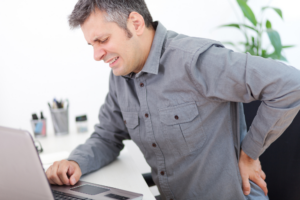
Living with back pain isn’t easy, but it’s also fairly common. As many as 8 in 10 Americans will deal with back pain at some point in their lives according to the American Chiropractic Association.
This leaves many people searching for ways that they can help improve the pain they’re experiencing. Unfortunately, many of the everyday things you do may actually make your back pain worse without you realizing it.
What makes back pain worse? Here are just a few problematic behaviors and what you can do to avoid them and relieve your pain.
Being Sedentary
You know the phrase “use it or lose it”? Well, being a couch potato can lead to something called muscle disuse syndrome, causing muscles to lose endurance and strength. In the end, this makes the muscles that support your back less efficient, and doing simple tasks will take more work.
Weak muscles can also lead to falls, and those falls can lead to even less movement and more pain. It’s a giant snowball effect that can be remedied by simply getting more movement in your day. Starting very small, such as walking for five or 10 minutes, can be just what you need to jumpstart more activity and get your back feeling better.
Talk to your doctor about safe and effective exercise you can do to help improve your back pain and get your body moving once again.
Eating an Unhealthy Diet
Food, at its most basic, is fuel for your body. If you fuel your body with saturated fat and refined sugar, then you’re not giving it what it needs to work optimally. In fact, a poor diet will make your body less efficient, moving more tiresome, and pain worse.
Researchers are still working to understand the link between diet and pain, but what they know so far is that supplying your body with foods that can cause inflammation — such as high-fat, high-sugar foods — will only make the pain worse.
The key to using diet to help manage your back pain is to aim for balance. Make sure you eat enough fresh fruits and vegetables, whole grains, and lean proteins in your diet, and drink plenty of water, too — because pain perception can be worse if you’re dehydrated.
You don’t have to go to extremes either. It’s okay to have a cheeseburger or a piece of cake every once in a while. The key to eating healthy is to make sure you enjoy everything in moderation, and make the bulk of what you eat each day whole foods that aren’t highly processed.
Stress
Stress is an unavoidable part of life. But if you don’t find a healthy outlet for it, you may find that your existing back pain gets worse. That’s because stress can cause anxiety, tense muscles, and agitation, all of which contribute to feelings of more intense pain.
The reason? When you’re stressed, your body releases a hormone called cortisol. This “stress hormone” can make inflammation worse and lead to more intense feelings of pain.
To deal with stress and keep it from making your back pain worse, you should practice techniques proven to help. Meditation, deep breathing, exercise, or simply jamming out to your favorite album can help you to relax and calm down when you’re feeling stressed.
Reducing stress can have a positive impact on your pain, both emotionally and physically, so find a way that works for you to shrug off the daily stresses of life and see how much better you feel – but don’t stress yourself out about it!
Smoking
You may have heard that sitting is the new smoking, but that doesn’t mean smoking isn’t still one of the worst things you can do for your overall health and wellness — especially if you suffer from back pain.
Many studies have found that smoking makes chronic pain worse. Specifically, it will make the pain you’re already experiencing more intense.
Just as bad, it increases the likelihood that you’ll develop chronic pain to begin with. The National Institutes of Health report that people who smoke are three times more likely to develop back pain chronically than those who don’t.
Why? Nicotine and tobacco reduce the amount of oxygen that reaches your muscles. Your muscles need oxygen in order to function optimally and efficiently. Smoking will lead to fatigue and lung disorders and make it more difficult for your body to do what it was made to do — heal itself.
The solution to this problem is simple: stop smoking. Of course, if you’re a smoker, you know that’s easier said than done. Luckily, there’s a lot of help available to assist you in quitting. Talk to your doctor about how to get started.
Doing Too Much
Wait, didn’t an earlier item on the list say that being too sedentary was bad? Now being too active is a bad thing? We know — it’s confusing. If you suffer from chronic back pain, you essentially need to find the “Goldilocks Zone”: be active enough that your back pain doesn’t get worse without overdoing it and risking further injury.
Sound complicated? It doesn’t have to be.
Basically, when you suffer from chronic back pain, you need to make sure you do a steady level of activity each day. It doesn’t matter if you’re feeling great some days and “meh” on others — never push yourself too much.
Otherwise, you risk overdoing it and setting yourself up for several days of painful recovery. If you have a goal of losing weight or becoming more fit, pace yourself and increase the strenuousness of your workout only incrementally. Not sure whether a particular activity might be too much for your back? Talk to your doctor first.
At Atlanta Spine & Orthopaedics Clinic, we understand the challenges of living with chronic back pain. Contact us for help to get you started on your road to recovery.
